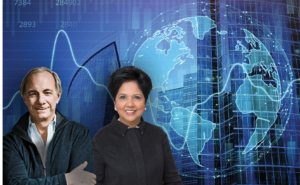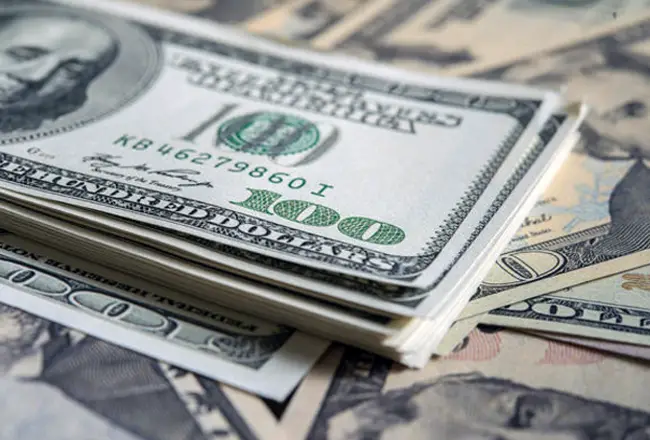Covid, China and the new commander-in-chief were the main topics at the third annual Greenwich Economic Forum, held virtually Nov. 9-11.

Speaking on Nov. 9, Bridgewater Associates founder Ray Dalio cheered that day”™s announcement that Pfizer”™s Covid-19 vaccine candidate was more than 90% effective in preventing coronavirus in trial volunteers.
“One way or another, the virus will go away, I think,” he said. “Then we will go back to relative normal, we assume.”
Dalio further said the recent election was the latest proof that “The biggest problem is that we have the largest political divide and wealth divide in this country since the 1930s.”
And, as he did at last year”™s GEF, the Greenwich billionaire warned that, should the current “political gap, opportunity gap, and wealth gap” continue, a civil war could erupt. “There”™s a limitation to what people will give up,” he declared.
Dalio called the current moment analogous to 1933 and 1971: “We have quite a lot of debt, and we”™re funding that with the printing of money,” he said. “The dollar has been weakening ”“ but not unacceptably so.”
The Republican party”™s presumed ongoing control of the U.S. Senate could help quell fears of a monolithic Democratic party, which in January will hold both the presidency and a majority of the House of Representatives, he added. The economic challenges facing the country will thus “be dealt with in a less confrontational way,” he predicted.
Dalio touted China”™s rise on the world”™s economic stage, where per capita income has increased by 81%, and life expectancy by about three years, over the past decade, as a positive. Foreign investment in the Chinese market has gone from about 1% in 2015 to around 60% today, he said.
The presumed cooling down of the U.S.-China trade war under the pending Joe Biden administration, as well as a possible de-escalation in military spending in both countries, could bode well: “There is a lot to argue about,” he said, but “if there is mutual respect,” a high level of cooperation can be achieved.
Dalio, who said he has traveled to China regularly since 1984, said the country today very much embodies a quote attributed to the late leader of the Communist Party of China, Deng Xiaoping: “To be rich is glorious.”
Dalio also said that regulators in China, commonly viewed as unusually tough, are similar to those in the U.S. and elsewhere.
Even after China made good on its threat to suspend Ant Group’s record-breaking $37 billion public listing on Nov. 11, Dalio sounded a note of approval that same day at a virtual town hall conference.
“Ant is a whole new concept in terms of banking, and almost could replace or threaten the banking system in China,” he said. “And it hasn’t yet been properly established in terms of regulatory review and the like.”
As for his pro-China stance, “People have accused me of being biased, naive, and in some cases unpatriotic,” he said at the town hall. “I think I’m just being objective.”
Questioning unemployment figures
In his Nov. 10 keynote address, Carlyle Group Co-founder and Co-executive chairman David Rubenstein declared that “The U.S. is the best place in the world to invest in. Otherwise, it”™s probably China.”
Rubenstein predicted that the U.S. will grow out of its current recession somewhere between the end of 2021 and the middle of 2022, “with the help of a lot of economic stimulus support” from the federal government. The keys, he said, are getting people back to work, retraining workers where necessary, and “making sure the (presumed) vaccine is working.”
He echoed Dalio”™s concerns about income inequality ”“ “Nobody has the answer to that,” Rubenstein said ”“ and bemoaned the fact that some 14% of U.S. adults are considered functionally illiterate.
He also seconded Dalio”™s belief that the Republicans”™ presumed continued control of the Senate will be an economic plus: “Over the last 50 years or so, GDP does slightly better than when the government is all in one party.”
Rubenstein further said that fears about the country going into a decidedly liberal direction were unfounded, with wholesale changes in the tax structure, health care, and other areas unlikely.
“Joe Biden is not a flamethrower, he”™s an accommodationist,” he said. “He”™s far more to the left than Donald Trump, but not as much as Bernie Sanders or Elizabeth Warren would have been.”
Minus the pandemic, or if anyone other than Biden had been the Democratic Presidential nominee, “Donald Trump would have won overwhelmingly,” Rubenstein declared. Even with the lame duck president”™s tax issues, the Robert Mueller investigation, and impeachment, Trump still received over 72 million votes, he noted.
Rubenstein further said that Trump could conceivably run again in 2024, given that he will then be roughly the same age as Biden is now. Either way, “I don”™t think he”™s gone from public view,” given his millions of Twitter followers and television and radio opportunities, Rubenstein said.
Of Covid-19, Rubenstein was less bullish. “The pandemic is not going to go away so quickly,” he predicted. While the Pfizer vaccine will probably soon by followed by similar treatments from such companies as Merck, Moderna and AstraZeneca, “It doesn”™t necessarily mean everyone is going to take it or have quick access to it,” he said.
Rubenstein predicted that it will probably take until the third or even fourth quarter for everyone wanting to take the vaccine to do so. Whether a U.S.-produced vaccine will be limited to U.S. distribution would be “not appropriate,” he added.
The Carlyle Group executive further said that the stock market”™s ongoing strong performance in the face of Covid-19 is effectively masking the ills of such business sectors as restaurants, sports, and hospitality, “which obviously haven”™t done as well.”
The latest national unemployment figure of about 8% is also misleading, Rubenstein said, as it does not reflect those who have “given up” on finding employment in the current environment. In actuality, he said, the national unemployment rate is probably “about 15% or so.”
‘Win/win for U.S. economy and climate’
A Nov. 9 panel discussion on the post-election economy found participants also reacting favorably to the Pfizer news. Even with the recent spike in Covid cases, “We don”™t think we”™ll go back to March-April levels,” said Jay Bryson, chief economist at Wells Fargo. There is also “tremendous pressure” for states not to go back into full-lockdown mode anytime soon, he added.
Biden”™s presumed multi-lateral approach to financial markets and the climate “will be beneficial for the U.S. and global economies,” said Catherine Mann, global chief economist, Citi. That the president-elect has already announced the nation will rejoin the Paris Accords will provide further opportunities for U.S. companies to compete in markets for green products and services; “A win/win for the U.S. economy and the climate,” she said.
Competing with China in the tech market, however, is an issue that “is not going away,” Mann said. Still, “trade discussions can be more fruitful under Biden”™s approach,” she added.
Bryson suggested that the U.S. could turn to Europe and “say we need to do something about China,” saying that a multi-lateral, rather than bi-lateral, approach to that country would appear more likely under Biden than Trump.
The panel generally agreed that Trump”™s “regulatory legacy” will likely “snap back” to what it was before he took office. Mick Mulvaney — Trump”™s former White House Chief of Staff and Director of the Office of Management and Budget who is now the U.S. Special Envoy for Northern Ireland ”“ added that the general atmosphere will be “choppy ”“ possibly very choppy ”“ between now and Jan. 20,” when Biden is sworn in.
Mulvaney said that Trump would be “better off leaving gracefully than under some type of cloud.”
As for the lame duck”™s refusal so far to concede the results of the election, “The President doesn”™t have a bigger cheerleader right now than me,” Mulvaney said. “But it”™s quickly going to become ”˜put up or shut up”™” when it comes to presenting actual evidence of voter fraud.
In a separate presentation, Jack Lew, secretary of the treasury during the Obama administration and now a managing partner at private equity firm Lindsay Goldberg, said that until the pandemic is under control, “we can”™t get back to normal. We have to keep our sense of what”™s possible ”“ even if a vaccine works ”¦. We”™re looking ahead to a long slog for the next year or two.”
However, he said, Biden”™s presumed “return to normalcy” will have a calming effect on the rest of the world, Lew said. “There”™s a global sigh of relief that we”™re back in control.”
He expressed hope that Congress will pass another sizeable economic stimulus bill, possibly before Biden”™s inauguration. “Even a week before the election,” he said, “(Treasury Secretary Steve) Mnuchin and (Speaker of the House Nancy) Pelosi were awfully close” to an agreement.
The “startling number” of households on the edge of eviction and hunger, which negatively affects the housing, retail and food sectors, must be addressed sooner than later, Lew said; otherwise, “businesses in underprivileged areas are not going to make it through a second wave.”
Lew also called for improvements to that nation”™s infrastructure, which he said had been delayed by partisan rifts for too long. “That”™s something we should be able to agree on,” he said.
‘Pandemic exposed the fault lines’
During a Nov. 11 discussion, Indra Nooyi and Dr. Albert Ko ”“ co-chairs of the Reopen Connecticut Advisory Group ”“ said that addressing social inequities is critical as the world continues to try and navigate the Covid-19 crisis.
“The pandemic exposed the fault lines,” Ko ”“ also a member of the Governor”™s Covid-19 Vaccine Advisory Group ”“ said. In addition to deficiencies in infrastructure and a lack of investment in public health both here and abroad, Ko said that “equity is the key lesson to come out of the pandemic,” given how underprivileged communities have been particularly hard hit.
“We tell everyone to wash their hands, but many places don”™t have clean water,” Nooyi, former CEO of PepsiCo and a member of Amazon”™s board of directors, said. She called for a global acceptance that the health crisis, climate change, and other challenges “are long-term societal issues, not political issues.
“We can”™t afford to sweep these problems under the rug anymore,” she said. “We know what the issues are, and what we need to do,” saying that reliance on government to come up with solutions was not sufficient; instead, Nooyi said, companies, individuals, and society at large must engage together.
All told, “Connecticut is doing well” with Covid, she said, though Ko warned that “the threat of a resurgence was always ever-present.”
And while both said they were pleased by the Pfizer announcement, Ko said it represented merely “a first step down a long road.” Production, storage and distribution of a viable vaccine in an equitable manner worldwide will be mandatory, he said, to control a virus that “knows no borders.
“It will take a while to get all the steps done,” he said, noting that any holes in the distribution and administration of the vaccine would be self-defeating. “”˜Back to normal”™ is not going to happen in the near future.”






















